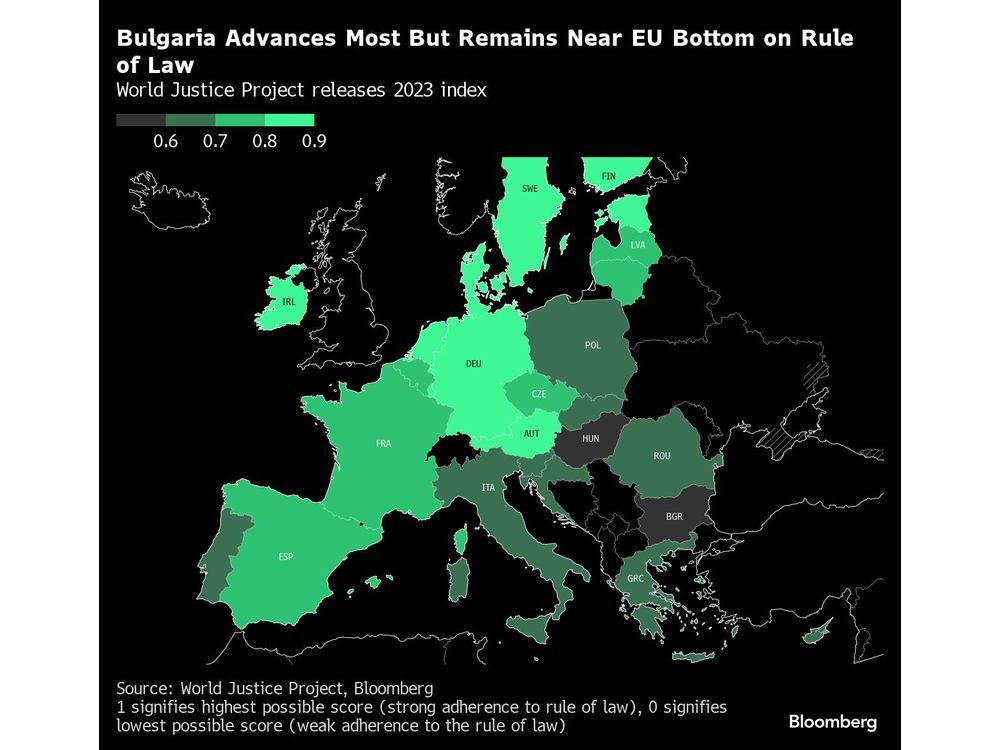
Article content
(Bloomberg) — The European Union is the only region where rule of law standards have held more or less steady amid a continued erosion over the past year, as Russia’s war in Ukraine prompted some countries to move closer to the bloc’s values, according to a major index tracking the issue globally.
Bulgaria saw the greatest improvement of any country worldwide in its rule of law score from the previous year, though it “still has significant space for improvement,” according to Leslie Solis, the research director for the World Justice Project’s EU Subnational Project. The country still ranks 26th among EU member states, trailed only by Hungary.
Article content
Civil justice issues were “the most widespread problem” in EU member states, Solis said in a media briefing, noting this was particularly driven by affordability and accessibility of justice. For Hungary and Poland, which have both faced the loss of EU funding over rule of law concerns, the group found the biggest issue to be the lack of constraints on government powers.
Of the 10 countries that aspire to EU membership — in which rule of law is one of the key criteria — standards fell in six but improved in three: Georgia, Kosovo, and Moldova. Montenegro was tracked for the first time.
Ukraine saw the biggest fall in its score among EU aspirants, though that was almost entirely a result of weaker measures of order and security as a result of the war, according to WJP Executive Director Elizabeth Andersen.
Within the EU, Greece saw the biggest fall from the previous year in its rule of law score, with measures of justice and corruption declining the most. Among the bloc’s largest economies, Germany and Italy held steady, while France and Spain’s scores slipped.
Bulgaria — for years dubbed the EU’s most corrupt member — is trying to overcome a political crisis triggered by mass protests over its governments’ suspected links with the mafia. A coalition government has been working for four months to overhaul the judiciary and help Bulgaria’s efforts to join the Schengen border system after skepticism from other members over its ability to tackle organized crime and border control.
Article content
The new cabinet is also shifting away from deep Russian influence in the economy and energy sector, while strengthening military support for Ukraine after earlier hesitation. The war played its part: Bulgaria was among the first countries that got cut off from Russian gas supplies after refusing to pay in rubles.
The non-profit World Justice Project’s annual Rule of Law Index for 2023 showed the rule of law weakened in more countries than it improved in for a sixth consecutive year.
“The world remains gripped by a rule of law recession characterized by executive overreach, curtailing of human rights, and justice systems that are failing to meet people’s needs,” WJP co-founder and president William Neukom said in a news release. “People around the world are paying the price.”
The EU was a rare spot of stability globally, with 13 countries in the bloc improving and 14 declining in their index score. EU countries and Norway made up 9 of the top 10 ranked countries globally, led by Denmark in first place. The US’s score slipped from 2022, though it held onto its place as the 26th-ranked country. Every other region saw a year-on-year decline in rule-of-law standards, with the largest fall for South Asia.
The index measures the experiences and perceptions of the rule of law in 142 countries and jurisdictions, based on surveys with more than 149,000 households and over 3,400 experts and lawyers between February-June 2023. It measures countries on a range of standards including access to justice, constraints on government powers, including freedom of the press, and fundamental rights.
—With assistance from Slav Okov.
Share this article in your social network